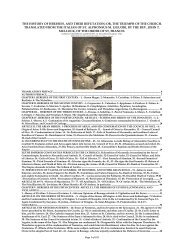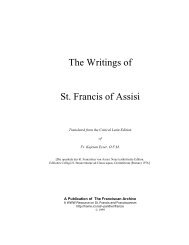Saint Anthony Mary Claret - Catholic Apologetics Information
Saint Anthony Mary Claret - Catholic Apologetics Information
Saint Anthony Mary Claret - Catholic Apologetics Information
You also want an ePaper? Increase the reach of your titles
YUMPU automatically turns print PDFs into web optimized ePapers that Google loves.
and the one that pleased and profited me the most. As the name of the one who practiced the virtue was<br />
not revealed, there was no danger of any one becoming vain; and we all benefited from learning how a<br />
virtue had been practiced so that we could do something similar on another occasion. How often I used<br />
to tell myself, "How well this virtue would suit you! You must put it into practice." And I would, with<br />
the help of God's grace.<br />
145. The Jesuit rule calls for no mandatory mortifications, but there is perhaps no other order in<br />
which they are more practiced. Some mortifications are seen, others are not, but they must all be done<br />
with the permission of the director. On Fridays everyone fasted, and the same almost held true for<br />
Saturdays, because that evening when each was served an egg with his salad, nobody took it. Most left<br />
their dessert untouched, or else took very little. They also left a great part of the other dishes untouched,<br />
and always the ones they liked best. I observed that they all ate very little any day, and that the stoutest<br />
fathers were always the ones who ate the least.<br />
146. There was a priest there called the spiritual father of the house, 97 who nearly every day, except<br />
Sunday, took nothing but bread and water, and did that on his knees, at a low table in the middle of the<br />
refectory. He stayed in this posture throughout the Community's dinner or supper. Anyone who saw that<br />
venerable man on his knees in front of the little table set with bread and water felt terribly ashamed to be<br />
sitting comfortably and enjoying a meal.<br />
147. There was also a father called the collector or corporal. 98 On Wednesdays, Fridays, Saturdays,<br />
and the vigils of important feasts, he would pass around a little blank notebook in which each person<br />
would briefly jot down the thing he wanted to do: e.g., Father or Brother So-and-so would like to eat off<br />
the floor, say grace before and after meals with arms outstretched in the form of a cross, serve at tables,<br />
wash dishes, etc.<br />
All of this was done without breaking silence, in the following manner. When the time came, the<br />
collector would make his rounds, knock at each door, open it, and wait outside. The father inside would<br />
come to the door, take the notebook back to his table, write on a single line what he wanted to do, and<br />
return the notebook to the collector. Thus it was passed around to everyone. Then it was brought to the<br />
rector, who would say, "X and Y, yes; the rest, no." The collector would make the rounds again,<br />
knocking at and opening the door, and letting each one know, by a movement of his head, whether the<br />
answer was yes or no.<br />
148. Besides these external and public mortifications, there were others of a more private character,<br />
such as wearing the cilice, small arm-chains, hairshirts; taking the discipline, etc.; cleaning chamberpots,<br />
lavatories, sooty lamps, etc. But to do any of these things, permission was always required.<br />
149. Some of the mortifications assigned were unasked for and hardly looked like mortifications. I<br />
will mention a few that I experienced. I have never liked playing games, and for that reason they made<br />
me play every Thursday when we went to a park. I begged the rector, in all simplicity, to be good<br />
enough to let me study or pray instead. He answered me roundly that I should play and play well. I<br />
applied myself so thoroughly to playing that I won all the games.<br />
150. Once I noticed that one of the priests of the house had to celebrate Mass very late on feast<br />
days, and I realized that having to wait that long fasting must have been very inconvenient for him,<br />
although he never complained about it. Out of compassion for him I went to the Superior and told him<br />
that, if it was his good will and pleasure, I would say a late Mass because a late breakfast didn't bother<br />
me. Thus, the other priest could say Mass earlier at my assigned time, which was much easier. The<br />
Superior said he would see, and the result was that from then on I was scheduled to say Mass even<br />
earlier.<br />
151. I have already mentioned that when I left for Rome the only books I brought with me were a<br />
one-volume breviary and a small-print edition of the Bible, which I could read every day, since I have<br />
always been a great reader of the Scriptures. When I got to the novitiate, they assigned me a room<br />
supplied with all the books I would need except the Bible, which I was so attached to. When they came<br />
to get my regular clothing they also took the Bible I had brought. I asked for it and was told, "Very<br />
well." But the fact is that I never saw it again until the day I had to leave because of sickness; only then<br />
97 Fr. John M. Ratti (1767-1851), a Milanese.<br />
98 The novices called the one who passed around the notebook the portinaro, caporale, or just capo.<br />
32













